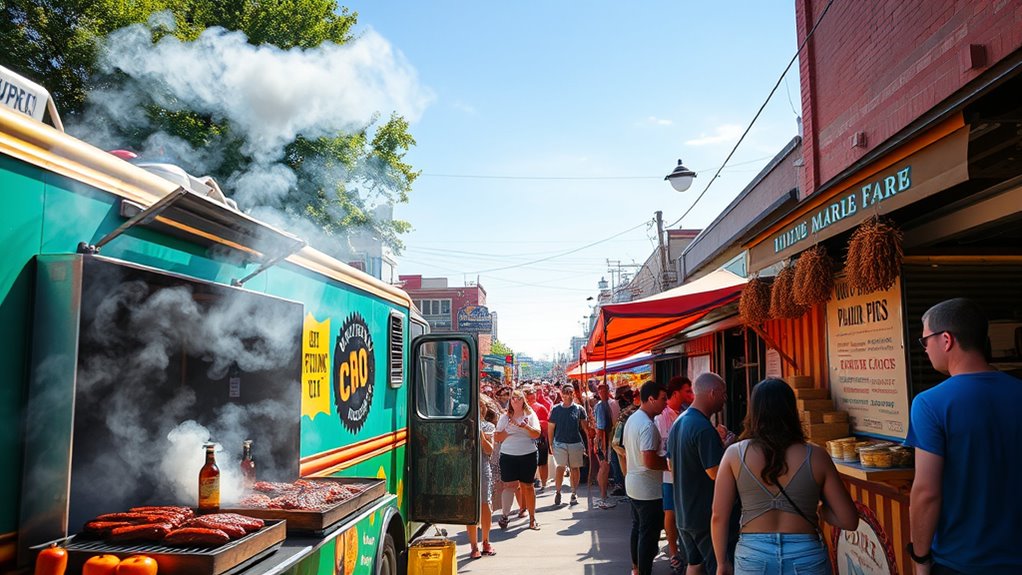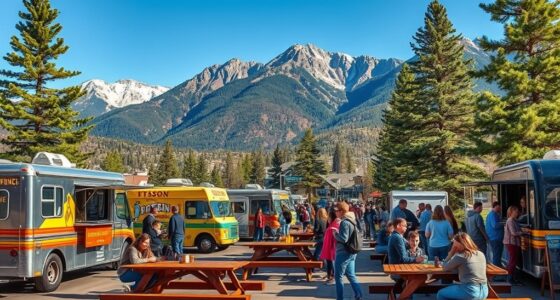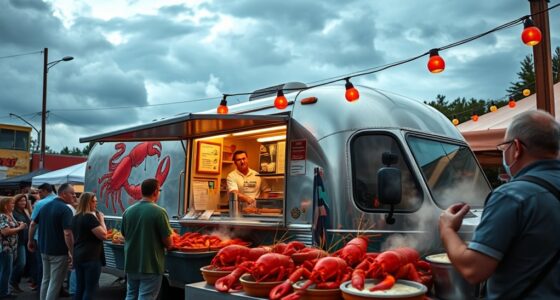In Kansas City, Kansas, food trucks showcase a rich mix of legendary barbecue and prairie-inspired cuisine. You can explore smoky, tender meats with signature sauces or enjoy dishes made from fresh, locally sourced ingredients like beef, pork, and vegetables. These mobile kitchens reflect community pride and regional flavors. If you’re curious about how these traditions are celebrated on wheels and want to discover the vibrant scene, there’s plenty more to uncover below.
Key Takeaways
- Kansas City food trucks serve authentic BBQ with signature smoky flavors, thick sauces, and regional specialties like burnt ends.
- Prairie fare highlights locally sourced ingredients, traditional dishes, and regional farming influences reflecting Kansas’s agricultural heritage.
- Food trucks integrate BBQ and prairie cuisine, offering diverse menus that celebrate community pride and regional flavors.
- Permitting, safety standards, and technology tools are essential for compliant and successful BBQ and prairie fare food truck operations.
- Community events and festivals provide opportunities to explore and enjoy Kansas City’s rich BBQ and prairie culinary traditions.
The Rise of Food Trucks in Kansas City, Kansas
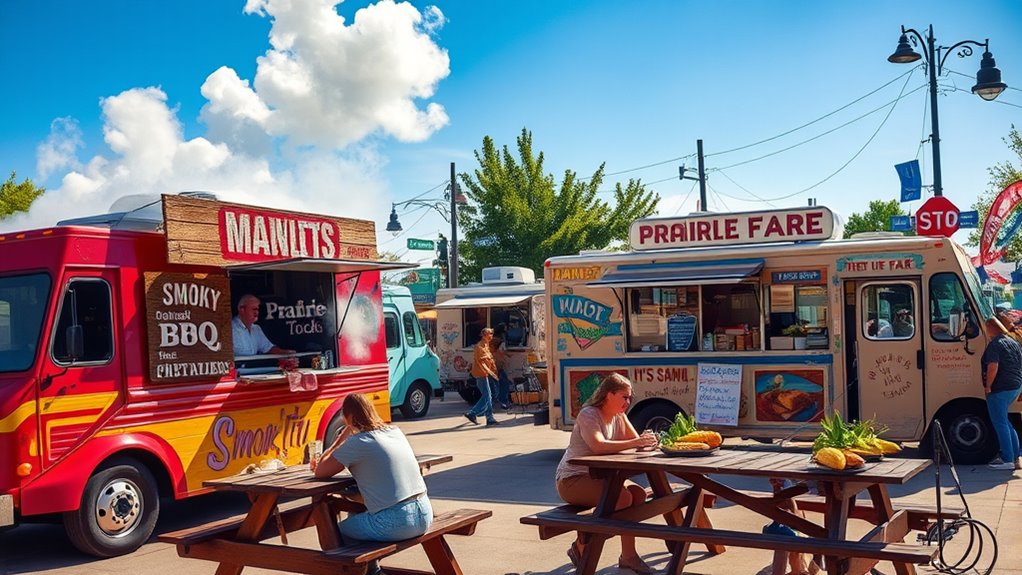
Have you noticed how food trucks have become a staple in Kansas City, Kansas? They offer a flexible, accessible way to enjoy diverse cuisine without the traditional restaurant setting. Many entrepreneurs jumped into the market after job losses during the COVID-19 pandemic, seeing food trucks as an opportunity to serve local tastes and high-traffic areas like community events, farmers markets, and festivals. Despite the growth, salaries for food truck owners tend to be lower nationally—around $102,092 annually in Kansas, with wages averaging about $49.08 per hour. Hydrocolloid technology studies show that the sector remains steady but has limited growth due to low hiring activity. Still, the variety of opportunities to cater to local preferences keeps food trucks a essential part of Kansas City’s dynamic food scene.
Regional BBQ Styles and Signature Flavors
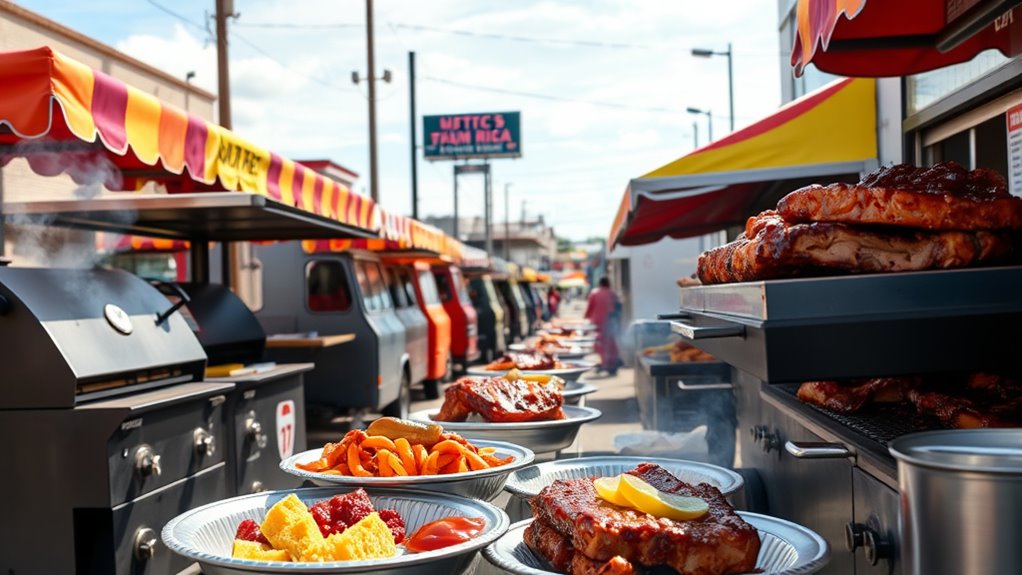
What makes Kansas City BBQ stand out among regional styles is its bold combination of smoky flavors, rich sauces, and a diverse selection of meats. You’ll notice the emphasis on slow-smoked meats like brisket, ribs, chicken, and sausage, all dry-rubbed beforehand for maximum flavor. The signature thick, sweet, and tangy tomato-based sauce, often made with molasses and brown sugar, complements the smoky richness. Each BBQ joint has its secret recipe, balancing sweetness, spice, and smoke. Kansas City’s unique fusion of Southern smoky traditions and Midwestern influences gives it broad appeal. You’ll find:
- Burnt ends, crispy and flavorful, a local specialty
- Wide variety of meats, from beef to fish
- Sauces ranging from sweet and tangy to spicy and bold
- The vibrant community events and festivals that celebrate this culinary tradition further enhance Kansas City’s barbecue scene.
Prairie Fare: Embracing Local Ingredients
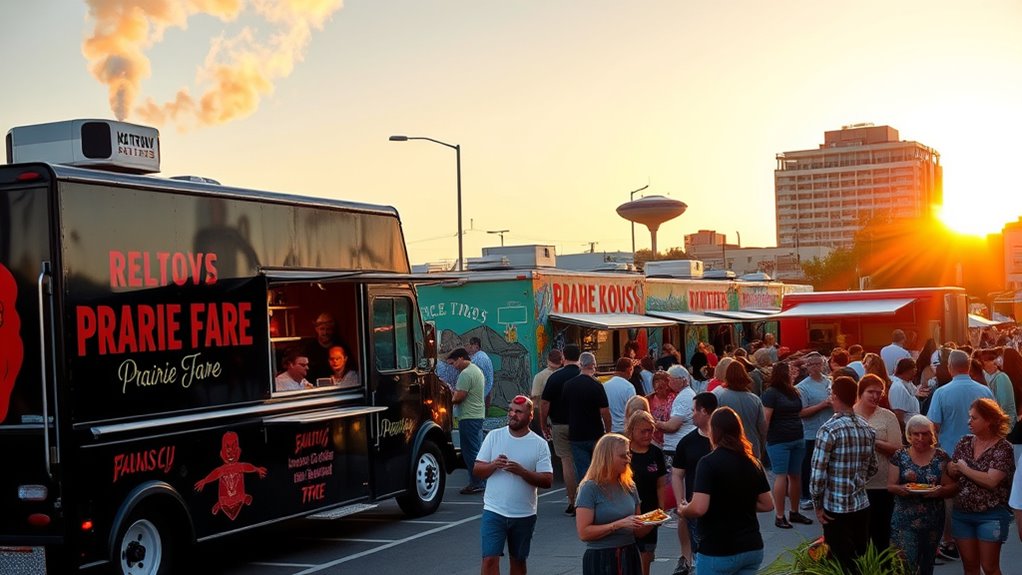
You can taste Kansas City’s prairie heritage in food trucks that prioritize local ingredients and traditional dishes. By sourcing from nearby farms, these trucks serve fresh, sustainable meats and vegetables that reflect the region’s farming practices. Embracing prairie fare helps you enjoy authentic flavors rooted in community and local tradition. Locally sourced ingredients ensure freshness and support regional farmers. CSA pickup locations and weekly updates provide easy access to seasonal produce that supports these culinary efforts.
Sourcing Regional Ingredients
Why is sourcing regional ingredients essential for prairie fare in Kansas City food trucks? Because it connects your menu to Kansas’s rich agricultural heritage, ensuring freshness and authenticity. By using local grains like wheat and sorghum, you reflect the state’s identity as “The Breadbasket of the World.” Access to a vast network of about 15,000 agricultural companies makes sourcing straightforward and reliable. Additionally, regional food networks like the Our Local Food program strengthen ties with nearby farms, guaranteeing ingredients are grown within specific counties. Economic incentives, such as reduced sales tax on food ingredients, make local sourcing more affordable. Community programs like Market Match encourage consumers to buy regional produce, supporting local farmers and boosting your prairie fare’s authenticity. Certifications and endorsements from beauty experts also help verify the quality and authenticity of locally sourced ingredients, ensuring your menu maintains high standards.
Traditional Prairie Dishes
Traditional prairie dishes highlight the region’s rich agricultural roots and immigrant influences, making them a perfect fit for Kansas City food trucks focused on local ingredients. You’ll find staples like beef and pork, reflecting Kansas’s cattle ranching and hog farming, along with corn, a key grain used in many recipes. Vegetables such as cabbage, potatoes, and kohlrabi—brought by European settlers—add hearty flavor. Cooking techniques like baking over open fires, boiling, and roasting were common, with preservation methods like curing and smoking keeping meats fresh. Canning and freezing summer produce became essential methods for preserving the harvest. Immigrant communities introduced dishes like stuffed cabbage rolls, kielbasa, and bread-based foods like bierocks. These dishes represent a resilient, resourceful culinary heritage rooted in local resources, blending tradition with regional flavors for a true prairie fare experience.
Navigating Permits and Regulatory Requirements
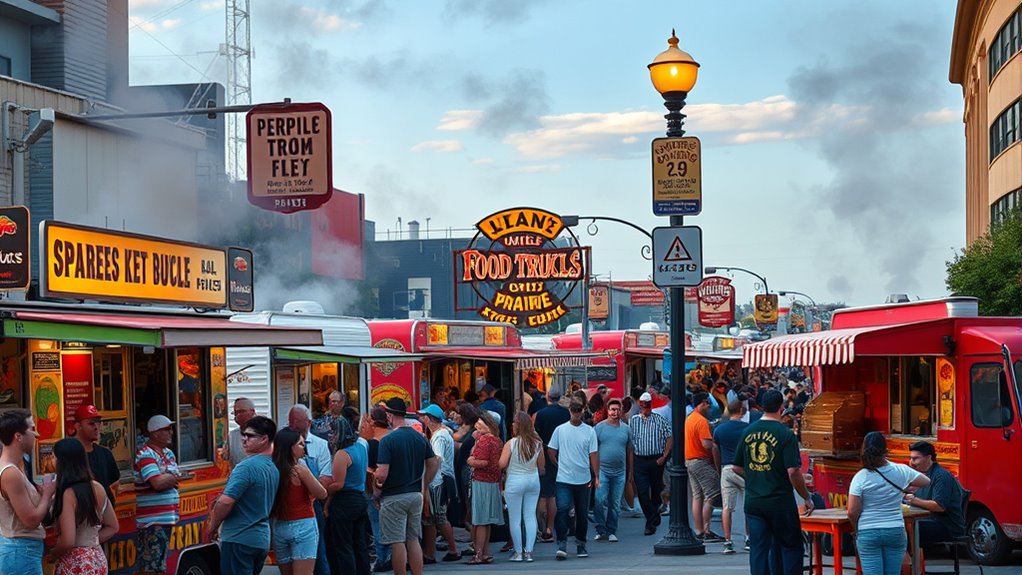
Handling permits and regulatory requirements for food trucks in Kansas City, Kansas can seem complex, but understanding the key steps simplifies the process. First, you need a Food Establishment License from the Kansas Department of Agriculture, along with registering your business with the Kansas Secretary of State. You’ll also require a Food Vending Stand License and possibly a Cereal Malt Beverage License if selling alcohol. Additionally, obtain city-specific vendor permits and display them prominently. The Food Establishment License is essential to ensure your facility meets health and safety standards and is issued after an inspection. Ensuring compliance with battery technologies and sustainable practices can also enhance your operation’s efficiency and appeal. – Submit permit applications at least 30 days before starting operations to allow for review and inspections. – Pass mandatory pre-opening inspections covering food safety, equipment, and fire safety. – Renew permits periodically, completing re-inspections and fee payments as required.
Ensuring Food Safety and Environmental Compliance

Ensuring food safety and environmental compliance is vital for the successful operation of your food truck in Kansas City. You must limit propane tanks to 100 lbs, store cylinders securely, and install appropriate hood systems within a year. Fire extinguishers should be ABC type, with Class K if you handle grease. Regular inspections and servicing are mandatory. Proper wastewater management is essential; all waste must follow local codes, with systems in place to transport it safely to approved sites. Maintain cleanliness by regularly cleaning grease traps and surfaces, and keep detailed logs of food temperatures and sanitation routines. Provide trash receptacles and remove waste daily. Limit noise and avoid excessive idling to reduce pollution. Additionally, affiliate information can help you select the best equipment and supplies to meet safety and environmental standards. Finally, ensure your truck passes annual safety inspections and displays current licensing stickers.
Overcoming Operational Challenges in the Food Truck Scene
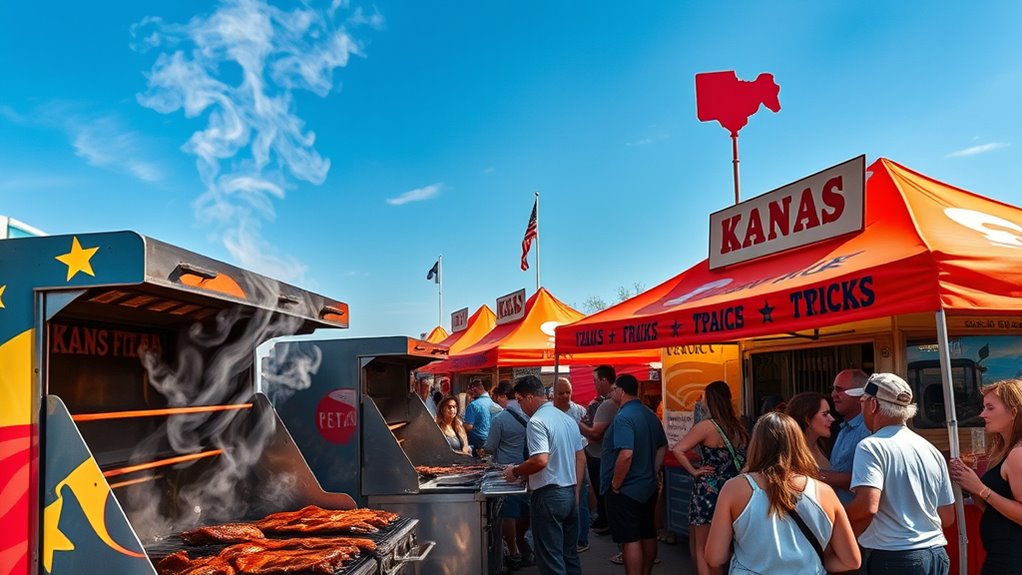
Managing health code compliance and steering permits can feel overwhelming, but staying informed helps you avoid costly delays. You’ll need to understand local regulations and maintain proper documentation to keep your operations running smoothly. By proactively addressing these requirements, you can minimize disruptions and focus on growing your business. Additionally, staying updated on regulatory guidelines ensures your food truck remains compliant with safety standards.
Managing Health Code Compliance
Managing health code compliance can be challenging for food truck operators, but understanding the specific requirements is essential to keep your business running smoothly. You need to ensure your potable water tank is at least 15 gallons, sourced from an approved public supply, with hoses preventing contamination. Waste tanks should be 15% larger, sloped for drainage, and emptied at approved sites. Handwashing stations must have warm water (minimum 100°F), soap, and signage. Staying updated on the Kansas Food Code, which now includes new sanitation standards effective since June 2023, is crucial for ongoing compliance. Additionally, proper waste disposal is critical—trash bins should be nearby, and gray water must be disposed of legally. Regular inspections are required by city authorities to ensure ongoing compliance with health and safety standards. Moreover, proper tank maintenance helps prevent contamination risks and ensures smooth operation during inspections.
- Maintain approved water and waste tanks, ensuring proper size and drainage
- Keep handwashing stations stocked with hot water, soap, and clear signage
- Stay informed on updated food safety regulations and routine health inspections
Navigating Permits and Fees
Managing permits and fees can be one of the most complex aspects of operating a food truck in Kansas City. You need to submit a complete application at least 30 days before opening, covering various permit types like mobile unit, pushcart, seasonal, or event permits. All fees are paid during the pre-inspection, with payments made by check or money order—cash isn’t accepted. Applications are submitted through the Compass KC online portal, which consolidates city departments and streamlines the process. Fees vary based on operation type and size, ranging from around $175 to over $1,000 for beverage permits. Timely planning is essential, especially for large events requiring multiple permits, to ensure compliance and avoid operational delays. Digital registration and support make traversing these requirements more manageable. Additionally, understanding the permitting process can help prevent delays and ensure a smooth launch.
The Cultural Significance of Mobile BBQ and Prairie Cuisine
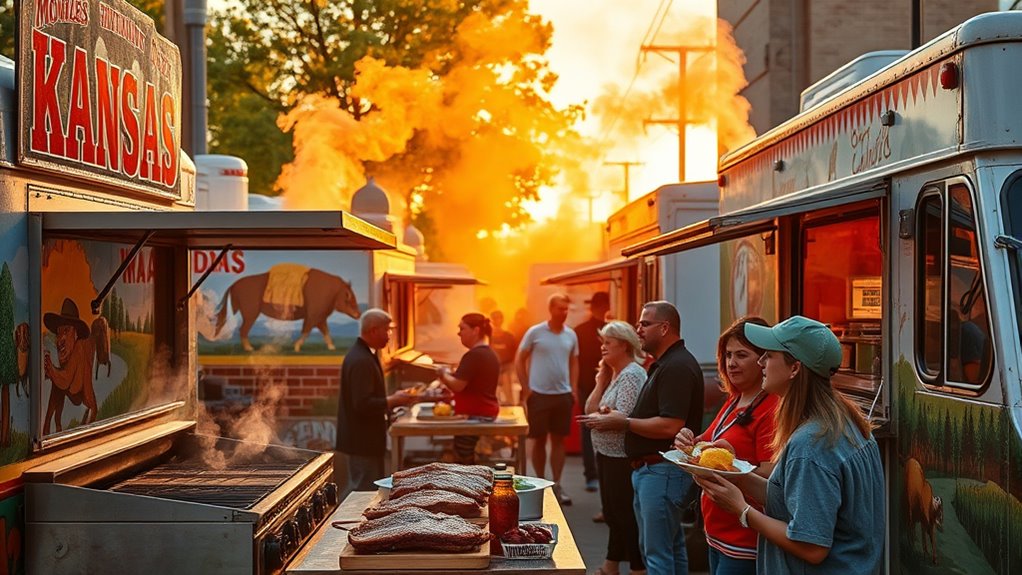
Kansas City’s mobile BBQ and prairie cuisine are more than just food; they’re indispensable expressions of community identity and cultural heritage. They reflect a history rooted in early street vendors like Henry Perry, who blended regional influences to create a unique local tradition. These foods symbolize pride, bringing people together at gatherings, festivals, and food trucks alike. You’ll notice how the city’s barbecue style emphasizes diverse meats, signature sauces, and smoky techniques using oak and hickory. Prairie ingredients also play a crucial role, connecting food truck offerings to local agriculture and heritage. This blend of traditions fosters a sense of belonging and cultural continuity, where food becomes a symbol of shared history and community spirit. It’s a flavorful way to celebrate Kansas City’s rich culinary and cultural landscape. Kansas City’s history of barbecue and prairie fare also continues to evolve through innovative chefs and food entrepreneurs who honor tradition while exploring new flavors.
Economic Impact and Community Engagement

Have you ever considered how food trucks substantially boost Kansas City’s local economy? They generate significant direct and indirect economic activity, especially during major events, with local sales often exceeding $1 million. The industry’s growth, now a multi-billion-dollar market nationally, fuels entrepreneurship and regional diversification. Food trucks support thousands of jobs, providing opportunities for income growth, business upgrades, and economic mobility. They act as incubators for small businesses and foster collaboration with local food hubs, boosting agriculture revenues by over $150 million. Additionally, implementing merchant services can further streamline transactions and enhance operational efficiency for these mobile vendors. Beyond economics, food trucks strengthen community ties by attracting diverse groups, revitalizing urban spaces, and promoting regional cuisines like BBQ and prairie fare. Effective policies help sustain this growth, balancing innovation with public safety, and maximizing benefits for Kansas City’s neighborhoods.
Future Trends and Opportunities for Kansas City Food Trucks

As the food truck industry continues to grow and adapt, emerging trends present both opportunities and challenges for operators in Kansas City. Regulatory restrictions, like the recent moratorium in key areas, create operational uncertainties but also push you to innovate with compliance and location strategies. Menu diversification, including seafood and plant-based options, offers a way to attract new customers while maintaining core favorites. Technology integration, through social media, online ordering, and location updates, enhances customer engagement and helps navigate restrictions. Additionally, expanding into event catering and private functions provides new revenue streams. Consumer spending growth and resilience in the food service sector present opportunities to capitalize on increased demand. Staying adaptable and leveraging digital tools will be key to thriving in Kansas City’s evolving food truck scene.
- Embrace menu innovation with seasonal and niche offerings
- Use social media and digital marketing to boost visibility
- Explore catering and event opportunities for growth
Frequently Asked Questions
How Do Food Trucks Maintain Consistency in BBQ Flavors?
You maintain consistency in BBQ flavors by using high-quality, specific cuts of meat prepared with uniform dry rubs and proper placement for even cooking. You control heat carefully, using seasoned wood and rotating meats within the smoker. Applying sauces only at the right stage, sticking to a standard recipe, and preparing signature items in bulk help guarantee each batch tastes the same. Focusing on a simplified menu also supports reliable flavor across all servings.
What Are the Latest Updates on Kansas City Food Truck Licensing Laws?
You need to stay current on Kansas City food truck licensing laws by regularly checking updates from the Kansas Department of Agriculture and local authorities. Make sure you submit your application at least 30 days before opening, pass all inspections, and pay applicable fees. Keep your licenses renewed, maintain compliance with health and safety standards, and stay informed about any changes in permit requirements or fee structures to operate smoothly.
How Are Food Trucks Adapting to New Environmental Regulations?
You’re adapting to new environmental regulations by adopting stricter waste disposal protocols and modifying your site setup to prevent blockages and traffic issues. You’re investing in better maintenance and cleanup to meet standards, which may temporarily impact your operations or increase costs. Attending educational sessions helps you understand and comply with these rules, reducing violations. While enforcement might mean occasional shutdowns, these efforts aim to safeguard infrastructure and ensure your long-term business sustainability.
What Are Common Customer Favorite Prairie Fare Dishes?
Like a well-worn trail, prairie fare dishes are favorites you’ll often find loved by customers. You’ll enjoy hearty smoked brisket, tender pulled pork sandwiches, and flavorful smoked sausage. Lighter options include grilled chicken seasoned with local spices. Classic sides like creamy coleslaw, baked beans, and warm cornbread perfectly complement these proteins. For dessert, pies and fruit cobblers satisfy sweet cravings, making prairie fare a comforting, hearty choice for many.
How Do Food Trucks Participate in Local Kansas City Events?
You can participate in Kansas City events by applying as a food truck vendor, submitting your business details, menu, and photos well in advance. Make sure you’re fully licensed and insured, with liability coverage over $1 million. During events, you’ll set up in designated areas, serve family-friendly dishes efficiently, and promote your brand through social media. Your presence helps attract diverse crowds, boosting sales and community visibility while adding to the event’s lively atmosphere.
Conclusion
While some might think food trucks can’t match traditional dining, they bring authentic Kansas City flavors right to your neighborhood. With a passion for regional BBQ and prairie fare, these trucks create vibrant community hubs and support local farmers. So, next time you see one, give it a try—you might just discover your new favorite spot. Food trucks aren’t just a trend—they’re a delicious, accessible way to experience Kansas City’s rich culinary heritage.
